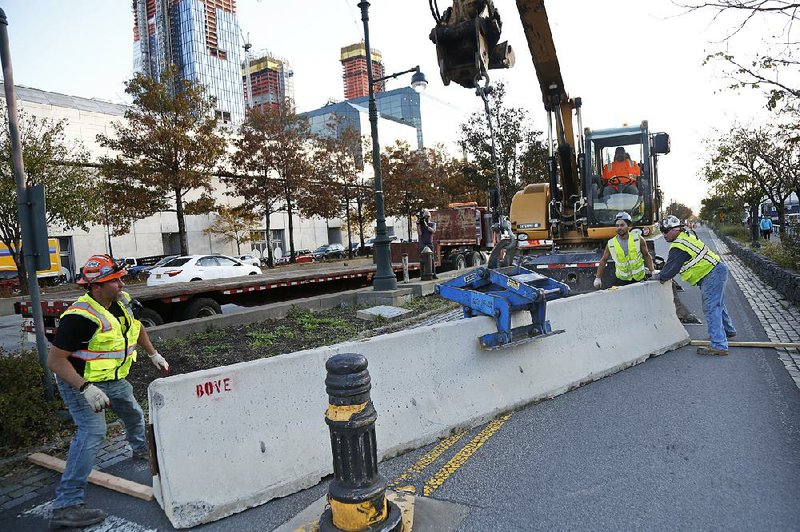WASHINGTON -- President Donald Trump on Thursday backed off his threat to send the suspect in this week's New York terrorist attack to the U.S. military prison at Guantanamo Bay, Cuba, but once again called for the man to be executed.
In response to questions from reporters, Trump said Wednesday that he would be open to transferring Sayfullo Saipov, the immigrant from Uzbekistan charged with plowing a pickup into passers-by in Manhattan, from the civilian justice system to the military system at Guantanamo. "Send him to Gitmo, I would certainly consider that, yes," he said.
Hours before walking back on that comment, Trump said on Twitter late Wednesday that Saipov, 29, "Should get death penalty!" -- using all capital letters -- in the attack that left eight people dead.
In tweets Thursday morning, Trump said justice would be better served through the "Federal system." The Thursday tweets came after news reports circulated about how the civilian courts have been more effective at convicting terrorism suspects than the troubled military tribunal system installed after the attacks of Sept. 11, 2001.
[PRESIDENT TRUMP: Timeline, appointments, executive orders + guide to actions in first 200 days]
"Would love to send the NYC terrorist to Guantanamo but statistically that process takes much longer than going through the Federal system," Trump wrote. "There is also something appropriate about keeping him in the home of the horrible crime he committed. Should move fast. DEATH PENALTY!"
The argument that Saipov should be tried in the same place where the terrorist attack that killed eight was committed mirrored the contention that President Barack Obama's administration made when it sought to put Khalid Shaikh Mohammed, the self-described mastermind of the Sept. 11 attacks, on trial in a civilian court in New York. But an uproar among city officials and business leaders at the time forced Obama's Justice Department to abandon the plan and keep Mohammed at Guantanamo.
Trump's call for capital punishment for Saipov, however, introduced a complication that may burden prosecutors and help defense attorneys.
Presidents are typically advised never to publicly weigh in on pending criminal cases. Such comments can be used by defense attorneys to argue that their clients cannot get a fair trial -- especially when the head of the executive branch that will prosecute a case advocates the ultimate punishment before a judge has heard a single shred of evidence at trial.
But Trump has disregarded such advice before. Just this week, a military judge said he would consider similar comments by Trump as evidence in favor of a lighter sentence for Sgt. Bowe Bergdahl, who pleaded guilty to desertion and endangering fellow troops by walking away from his post in Afghanistan, where he was later captured and held prisoner by the Taliban for five years.
Some legal experts said Thursday that judges in Manhattan's federal courts will not let the president's remarks slow the case or throw it off track, especially in a courthouse with a quarter-century record of swift terrorism prosecutions with mostly airtight outcomes.
"Nothing slows down the train," said James Cohen, a professor at Fordham Law School. He said the yet-to-be-assigned judge will question prospective jurors to ensure they can be fair despite anything they might have heard or read.
Lawyers differed over whether Trump was out of bounds.
"Even presidents are entitled to First Amendment rights," said Michael Wildes, a former federal prosecutor.
Joshua Dratel, a veteran defense attorney in terrorism cases, would not predict what a judge might do, but he said the tweets should disqualify prosecutors from seeking the death penalty.
"It's inconceivable that it would be fair to seek the death penalty when the president has expressed it twice in a tweet," he said. "It poisons the jurors, all the prospective jurors."
Sen. Lindsey Graham, R-S.C., meanwhile said he was "dumbfounded" as to why Trump had backed down from calls to send Saipov to Guantanamo.
"I appreciate President Trump taking the gloves off when it comes to unleashing our military" on the Islamic State, Graham said. "However, I'm dumbfounded as to why the Trump Administration still follows the Obama playbook when it comes to dealing with terror suspects."
Information for this article was contributed by Peter Baker of The New York Times; by Colleen Long, Larry Neumeister, Jennifer Peltz, Tom Hays, Karen Matthews and Kiley Armstrong of The Associated Press; and by Joe Sobczyk of Bloomberg News.
A Section on 11/03/2017
